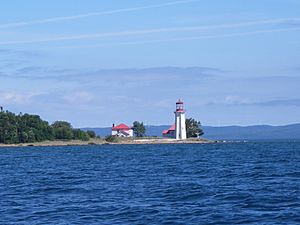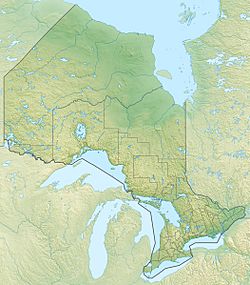Ile Parisienne Light facts for kids
 |
|
| Ile Parisienne Light - Northern side | |
|
|
|
| Location | Ile Parisienne Ontario Canada |
|---|---|
| Coordinates | 46°38′43″N 84°43′26.4″W / 46.64528°N 84.724000°W |
| Year first constructed | 1911 |
| Construction | concrete tower |
| Tower shape | hexagonal tower with balcony and lantern |
| Markings / pattern | white tower, red lantern |
| Height | 16.6 metres (54 ft) |
| Focal height | 16.1 metres (53 ft) |
| Current lens | modern optic, emergency, seasonal |
| Range | 25.75 kilometres (16.00 mi) |
| Characteristic | Fl W 10s. |
| Fog signal | none |
| CHS number | Inland-1082 |
| ARLHS number | CAN-567 |
| USCG number | 7-14510 |
The Ile Parisienne Light is a historic lighthouse built in 1911. It stands on the southern tip of Ile Parisienne, a remote island in the middle of Whitefish Bay. This bay is part of Lake Superior in Ontario, Canada. The lighthouse is very important for ships and boats traveling to and from the Soo Locks.
Life for the lighthouse keepers who worked here was often lonely and dangerous. Today, the light works automatically and turns on during certain seasons. It is a well-known landmark for both large ships and smaller pleasure boats.
Contents
Building the Lighthouse
The Ile Parisienne Light Station was set up in 1911. This was because more ships were using the Great Lakes after the Soo Locks were built. These locks help ships move between different lake levels. The lighthouse was needed to guide these ships safely.
What Does it Look Like?
The lighthouse is a white tower that stands out in the bay. It is made of concrete and has a unique six-sided shape. The tower has strong supports on the outside. It also has a small entrance with a sloped roof and tiny windows.
At the very top, there is a bright red lantern room. This room has ten sides and is where the light shines from. On top of the lantern, there's a weathervane shaped like a beaver. The lighthouse's design is a great example of early modern, useful architecture.
Stories from the Past
Ile Parisienne has seen many important events over the years. The lighthouse has played a key role in guiding ships and helping during emergencies.
Early Shipwrecks and Rescues
The first recorded shipwreck on Lake Superior happened near Ile Parisienne. In 1816, a canoe carrying people from the North West Company capsized. This happened during a conflict over fur trading. Several people sadly drowned in the accident.
The lighthouse's location in Whitefish Bay has been important for many rescues. In 1916, the steamship Panther sank after hitting another ship in the fog. Luckily, everyone on board was saved.
Another time, in 1919, the steamship Myron sank during a big storm. A rescue team searched for survivors near Ile Parisienne. The captain of the Myron was found alive 20 hours later, floating on wreckage. His clothes were frozen to his body.
Life as a Lighthouse Keeper
Being a lighthouse keeper at Ile Parisienne was a tough job. It was often very lonely and dangerous. Keepers had to live far away from others.
In April 1922, a small Canadian ship called the Lambton was taking lighthouse keepers to their stations. It disappeared during a strong storm on Whitefish Bay. All 16 crew members and 5 lighthouse keepers were lost. This included John Douglas, the Ile Parisienne lighthouse keeper, and his assistant, John Kay.
A Special Historic Place
The Ile Parisienne light tower is a very important building. In 1991, it was added to the Canadian Register of Historic Places. This means it is recognized for its history, design, and location.
The Canadian Coast Guard owns the light station. Today, the light works automatically using solar power. It shines seasonally, meaning it turns on during certain times of the year.
The lighthouse is not open to the public. This is because it is in an area with a lot of ship traffic. It is a very important guide for ships. However, you can see the light by taking a boat or plane tour.
 | Jewel Prestage |
 | Ella Baker |
 | Fannie Lou Hamer |


